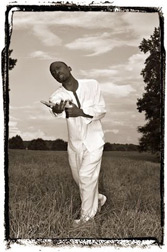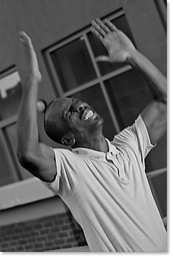|
An Interview with M. Ayodele Heath by Collin Kelley Atlanta, Georgia
M. Ayodele Heath – or Ayo as he’s known to friends and fellow poets – has been thrilling poetry lovers on the page and stage for more than a decade now. A two-time regional poetry slam champ and a top 10 finalist in the National Poetry Slam, Ayo’s stage performances are dramatic, emotional, humorous and provocative. But he’s just at home in literary magazines, such as The Chattahoochee Review, Crab Orchard Review, Open City and Creative Loafing. He’s also been lauded as the Best Spoken Word Artist in Atlanta by Creative Loafing, was awarded an Emerging Artists grant by the Atlanta Bureau for Cultural Affairs and selected as a fellow for at the Caversham Centre for the Arts in South Africa. He holds an MFA in poetry from New England College. Ayo was the first place winner in the 100 Poems for Haiti competition. I asked him a few questions about his winning poem “A Sharecropper’s Pantoum,” the art of writing, and if poetry can impact change on the world in such troubled times. Collin Kelley: When did you write "A Sharecropper's Pantoum" and what prompted it? M. Ayodele Heath: Let me first express my deepest sympathy for the citizens of Haiti and the incomprehensible suffering they've experienced as a result of the earthquake. "A Sharecropper's Pantoum" was prompted from prompts in a workshop with Cecilia Woloch in 2004. Collin Kelley: Talk about your process of writing this poem and your poetry in general. Do you go through multiple drafts, or do they go onto the page fully formed? M. Ayodele Heath: The first draft of this poem evolved over several weeks during an 8-week workshop with Cecilia Woloch, who is a goddess. One week, we did an exercise where we were to find a newspaper article that moved us in some way and use it as a basis for a poem. I'd heard an NPR story about the Haitian AIDS crisis, which led me to a Chicago Tribune article to read more on the subject. While the facts of the news article were moving, I still didn't have the stuff of a poem. The subject was too important to me to write something superficial. Because the situation which created the poem was one that would last, I wanted to create a poem that would last. So, I just held on to the article. A different week, Cecilia gave us a sheet of paper with maybe 100 random words on it. We were to close our eyes, pick 5 words at random from the page, and write a poem using those words. I remember picking the word "rainbow" and being initially repulsed in a literary elitist sort of way, but I've found that the things which produce the strongest emotional reaction for me (positive or negative) generally create the work, which I find most meaningful. Because I love challenges, I ended up writing a different poem with the word, "rainbow" – my challenge to myself to use rainbow in a way that wouldn't get me interviews with Hallmark Corporation. The third prompt (and the charm) which led to the first draft of "A Sharecropper's Pantoum" was Cecilia's review of several forms -- the sonnet, the villanelle, and the pantoum -- and a challenge to write a poem in a form, encouraging us to use form to explore an idea that we were having difficulty developing. I chose the pantoum, I chose the first person point of view, and I had clearly had a subject in the Haitian AIDS crisis, which had been troubling me. Voila, a first draft. Ideas for my poems come from all sorts of places, but my process once I have a first draft on paper is to move to aural mode for editing. I often recite the poem aloud to listen for places where the words stumble over themselves or record myself and play it back. In this way, I'm able to experience the poem as a listener. And I go back and forth between "the performance" and "the page" until they're one and the same -- 80 to 90 percent of my poems are revised in this way. Collin Kelley: Many believe that political poems have no lasting merit, but simply serve to promote a personal agenda. Can you speak about your feelings on writing poetry that has a political or activist slant? M. Ayodele Heath: I'm not sure who first said the following, but I believe it: All poetry is political. The idea that one's poem is not political is in itself a political position. The question for me is not if a poem is political, but how: Are the politics overt or covert? And I might add, that I believe the most revolutionary poems -- those which do the most work toward maintaining the status quo or subverting it -- are those poems which are covert. I'd agree that some overtly political poems have questionable longevity, but that is more a function of them not being well written than their political content. I believe that the key to writing political/activist poetry which has lasting merit is to make poems first, which is no different than writing any other poem -- focusing on music, memorable language, and emotional resonance such as Countee Cullen's "Incident" (on racism), Anna Akhmatova's "Requiem" (on life under the Stalinist regime), Joan Larkin's "Inventory" (on the AIDS epidemic), Suheir Hammad's "First Writing Since" (on being Arab in post-9/11 America), or Patricia Smith's collection, Blood Dazzler (on neglect in the aftermath of Hurricane Katrina). Collin Kelley: Do you believe poetry can make a change in the world, especially in a troubled nation like Haiti? M. Ayodele Heath: Most definitely. The way I see it, "the world" is made up of billions of individuals. And in that sense, poetry certainly has the power to change individuals: in a college classroom to lead a student to political leadership, on a wall in an office to inspire a researcher to develop a cure, in the heart of the oppressed to survive one more day. While poetry has a public aspect, I truly believe its greatest strength is its ability to speak to each of us, to change us as individuals – 6.5 billion strong. Collin Kelley: You've been published in literary journals, magazines and anthologies, as well as being an award-winning spoken word performer -- what's next for you? M. Ayodele Heath: Well, I've been in a bit of a drought since obtaining my MFA in 2007, so right now I'm in week 7 of Julia Cameron's The Artists Way. Lately, I've found myself over-intellectualizing the relationship between page and stage. I definitely feel The Artist's Way helping my right brain and left-brain to live in harmony. Next, (and so far it's proven a long next) is publishing a full-length manuscript of poems. Last fall, I submitted the collection, Night is a World Lit by Itself, to dozens of first book contests. So far, no luck, but I'm keeping hope alive! In the meantime, I found out last week, I've been accepted to Cave Canem, which I'll attend this summer with the intention of drawing a line in the sand and generating material for my second collection. The devastation after Haiti's earthquake is another event, which continues to trouble me, though it has fallen from the news consciousness. I hope to find a worthy vehicle of capturing my response to the Haitian earthquake through Cave Canem. For more about Ayo, visit www.ayospeaks.com. Please also see:
|
||||||||||||
|
Published in In Motion Magazine May 26, 2010 |
||||||||||||
If you have any thoughts on this or would like to contribute to an ongoing discussion in the  What is New? || Affirmative Action || Art Changes || Autonomy: Chiapas - California || Community Images || Education Rights || E-mail, Opinions and Discussion || En español || Essays from Ireland || Global Eyes || Healthcare || Human Rights/Civil Rights || Piri Thomas || Photo of the Week || QA: Interviews || Region || Rural America || Search || Donate || To be notified of new articles || Survey || In Motion Magazine's Store || In Motion Magazine Staff || In Unity Book of Photos || Links Around The World || OneWorld / US || NPC Productions Copyright © 1995-2014 NPC Productions as a compilation. All Rights Reserved. |



